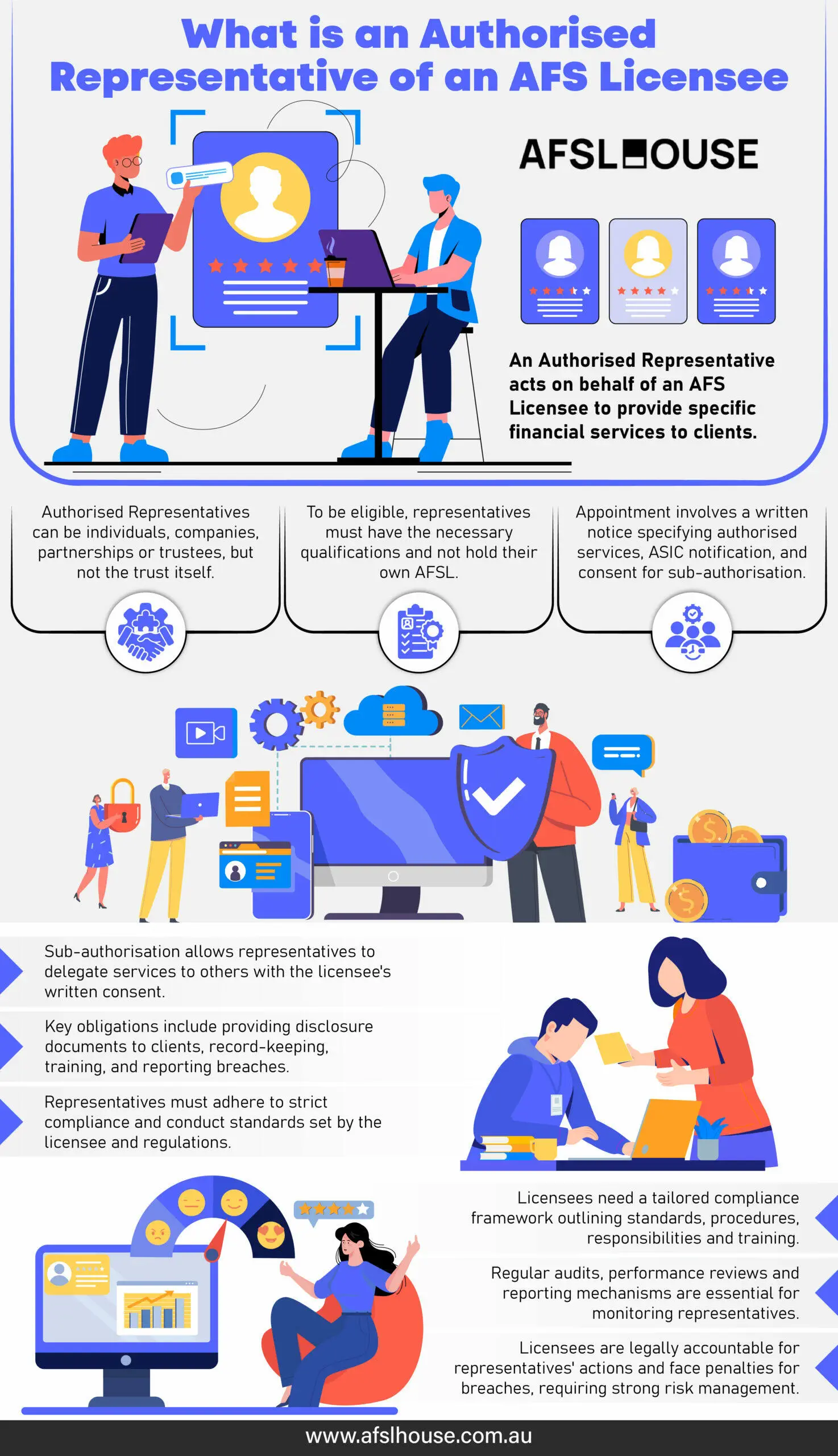Introduction
Authorised representatives play a pivotal role in the operations of Australian Financial Services (AFS) licensees, acting on behalf of the licensee to provide specified financial services. These individuals or entities ensure that financial services are delivered efficiently and in compliance with regulatory standards, thereby supporting the licensee’s ability to meet its obligations under the Corporations Act 2001 (Cth).
Understanding the significance of authorised representatives is essential for both licensees and those seeking to become authorised representatives themselves. This article delves into the various aspects of authorised representation, highlighting the responsibilities, regulatory requirements, and the crucial relationship between licensees and their authorised representatives.

Definition of an Authorised Representative
Types of Authorised Representatives
An authorised representative can be an individual, a body corporate, a partnership, or a group of trustees acting under a trust. While trusts themselves cannot be authorised representatives, individuals and corporate bodies that are trustees may be appointed as authorised representatives. This flexibility allows AFS licensees to designate various entities capable of providing financial services on their behalf.
Role and Scope of Services
Authorised representatives are empowered to provide specific financial services as designated by the AFS licensee, meaning the authorised representative does not need to hold an AFSL themselves. These services may include personal financial advice, dealing in financial products, and other activities outlined in the licensee’s AFSL. The scope of services an authorised representative can offer is determined by the written notice issued under the Corporations Act 2001 (Cth). This ensures that representatives act within the boundaries of their authorised roles, maintaining compliance with financial services regulations.
Get Your Free Initial Consultation
Consult with one of our experienced AFSL Lawyers today.
Eligibility and Appointment
Eligibility Criteria
To become an authorised representative, individuals or entities must meet specific requirements outlined in the Corporations Act 2001 (Cth) and ASIC guidelines. Eligible authorised representatives can include:
- Individuals: Must possess the necessary qualifications and competencies to provide financial services. They should not hold an AFSL independently but operate under the licensee’s authority.
- Bodies Corporate: Organisations such as companies or partnerships can act as authorised representatives, provided they adhere to the licensing conditions and have the licensee’s consent to sub-authorise their directors and employees.
- Trustees of a Trust: If the licensee is a group that acts as the trustees of a trust, each trustee engaged in financial services must be appointed as an authorised representative. However, the trust itself cannot hold this status.
Additionally, authorised representatives must not be employees or directors of another AFS licensee unless specific conditions are met, such as obtaining consent from all relevant licensees. This ensures that a representative is not simultaneously bound by conflicting obligations from multiple licensees.
Appointment Process
Appointing an authorised representative involves a systematic process to ensure compliance with regulatory standards:
- Written Notice: The licensee must authorise the individual or entity by providing a written notice under Sections 916A(1) and 916B(3) of the Corporations Act 2001 (Cth). This notice specifies the financial services the representative is authorised to provide, which may encompass some or all services covered by the licensee’s AFSL.
- Documentation: All appointments must be documented accurately, detailing the scope of authority and any restrictions applied to the authorised representative. This ensures clarity in the services they are permitted to offer on behalf of the licensee.
- Notification to ASIC: Within 30 business days of issuing the authorisation, the licensee must notify ASIC of the appointment using ASIC Connect. This updates the AFS Authorised Representatives Register, allowing the public to verify the authorised representative’s status and associated licensee. The notification should also indicate whether the authorised representative has the authority to sub-authorise others. Failure to include this may result in ASIC not recognising any sub-authorisations made by the representative.
- Consent for Sub-Authorisation: If the authorised representative intends to sub-authorise individuals, the licensee must provide written consent. For bodies corporate, this typically involves sub-authorising directors and employees to ensure they operate within the defined scope of financial services.
- Ongoing Compliance: After appointment, both the licensee and the authorised representative must ensure continued compliance with all regulatory obligations. This includes regular monitoring, conducting due diligence, and updating ASIC of any changes to the representative’s details or authorisation status within the stipulated timeframe.
By following these steps diligently, licensees can effectively appoint authorised representatives who are well-equipped to provide financial services in compliance with Australian regulatory standards.
Speak with an AFSL Lawyer Today
Request a Consultation to Get Started.
Sub-Authorisation: Rules and Limitations
Legal Framework for Sub-Authorisation
Sub-authorisation allows authorised representatives to delegate certain financial services to other individuals or entities, ensuring flexibility in service provision. According to Section 916B of the Corporations Act 2001 (Cth), an authorised representative may sub-authorise individuals to provide financial services on behalf of the licensee, provided that the licensee gives written consent.
Key legal requirements include:
- Licensee Consent: Written consent from the AFS licensee is mandatory for any sub-authorisation.
- Scope of Authority: The scope of sub-authorised services must align with the licensee’s authorisation under their AFSL.
Practical Implications of Sub-Authorisation
In practice, sub-authorisation enables authorised representatives, such as corporate bodies, to empower their directors and employees to offer financial services efficiently. For example, a corporate authorised representative may sub-authorise its staff to provide financial advice or sell financial products on behalf of the main licensee, ensuring that the services remain compliant with regulatory standards.
Consider the following scenarios:
- Body Corporate Sub-Authorising Employees: A corporate authorised representative can sub-authorise its employees to engage in financial services, enhancing operational capacity while maintaining regulatory compliance.
- Director-Level Sub-Authorisation: Directors within an authorised corporate representative may be sub-authorised to provide specialised financial services, ensuring that expertise is leveraged effectively.
Effective sub-authorisation requires clear documentation and adherence to the licensee’s consent and regulatory guidelines to mitigate risks and ensure ongoing compliance.
Notification of Appointment
How to Notify ASIC
To notify ASIC about the appointment, variation, or revocation of authorised representatives, use the ASIC Connect platform. This involves submitting a formal notification that includes details such as the representative’s name, contact information, and the scope of their authorised financial services. Once submitted, the information is immediately updated on ASIC’s Authorised Representatives Register, ensuring transparency and public accessibility.
Timelines and Compliance
All notifications to ASIC must be made within 30 business days from the date of appointment, variation, or revocation. Meeting this deadline is essential for maintaining compliance with regulatory requirements. Failure to notify ASIC within this timeframe may result in penalties or suspension of the licensee’s ability to appoint authorised representatives until compliance is achieved.
Get Your Free Initial Consultation
Consult with one of our experienced AFSL Lawyers today.
Obligations and Responsibilities of Authorised Representatives
To maintain transparency and adhere to financial services laws, authorised representatives have key obligations and responsibilities, primarily centred around disclosure and maintaining high standards of compliance and conduct.
Disclosure Requirements for Ensuring Transparency with Clients
Authorised representatives must provide clients with essential disclosure documents to ensure transparency and compliance with financial services laws. All disclosure documents should clearly state the relationship between the authorised representative and the AFS licensee, including the authorised representative number.
- Financial Services Guide (FSG): Where financial services and products are provided to retail clients, the FSG must be provided to the client as soon as possible after the first contact related to financial services, ideally at the beginning of the first client meeting.
- Product Disclosure Statement (PDS): Similarly, where financial services and products are provided to retail clients, a copy of the PDS must be given when offering a financial product. Applications to invest must accompany the PDS.
- Statement of Advice (SOA): This is required when providing personal financial product advice. The necessity of an SOA is contingent upon offering this type of advice rather than general advice.
- General Advice Warning: When offering general advice, representatives must include warnings that the advice was prepared without considering the client’s objectives, financial situation, or needs. Clients should assess the appropriateness of the advice in relation to their circumstances.
- Remuneration Details: Must disclose any commissions, fees, or other forms of remuneration related to the provided financial services. If the exact amount is unknown, the method for calculating remuneration must be disclosed.
Compliance and Conduct Standards
Authorised representatives are obligated to adhere to strict compliance and conduct standards to maintain the integrity of financial services. Responsibilities must be fulfilled within the limits of the authority granted by the licensee. With that said, the licensee is generally responsible for the training, competency, and conduct of its authorised representatives. Some of the main compliance and conduct standards that authorised representatives must adhere to include:
| Responsibility | Details |
| Record-Keeping | Maintain comprehensive records of all advice provided to each client, including details of any discussions, marketing material, FSGs, and PDSs provided, and disclosure documents issued. These records must be retained for a minimum of seven years. |
| Training and Competency | Participate in any training sessions required by the licensee to stay updated on compliance requirements and best practices set by the licensee. |
| Complaint Handling | Refer all client complaints to the AFS licensee promptly and ensure they are addressed in accordance with regulatory guidelines. The licensee is responsible for addressing these complaints. |
| Reporting Breaches | Inform the licensee immediately upon discovering any breach or incident of non-compliance. This includes, but is not limited to, failing to provide a client with the required general advice warning or FSG, or other regulatory obligations. |
| Adherence to Standards | Ensure all financial services are provided within the scope of authority granted by the licensee and comply with all relevant financial services laws and regulations. Unauthorised activities or exceeding the scope may result in compliance breaches. |
| Product Design & Distribution | Comply with product design and distribution requirements and TMD (Target Market Determinations) when providing financial services to retail clients. Compliance with product design and distribution is particularly relevant when dealing with specific financial products offered to retail clients. |
| Appointment in Writing | Be formally appointed in writing as an Authorised Representative of the Licensee. |
| Not Holding Out as Licensee | Not hold out that they have an AFSL. The AR should include their AR number and disclose the relationship with the Licensee in all business documents and on their website. |
| Compliance with Prohibitions | Comply with hawking prohibitions (for retail clients) and misleading and deceptive conduct provisions. |
| Compliance with Licensee Obligations | Comply with all obligations of the Licensee. |
By fulfilling these obligations, and with the licensee taking reasonable steps to ensure that its representatives comply with their best interests obligations, authorised representatives ensure they uphold the standards expected by regulatory bodies and maintain the trust of their clients.
Speak with an AFSL Lawyer Today
Request a Consultation to Get Started.
Compliance Measures and Monitoring
Developing a Compliance Framework
A tailored compliance framework is crucial for both authorised representatives and licensees, ensuring all operations adhere to regulatory requirements. The compliance framework should encompass:
- Regulatory Standards: Clearly outline the specific financial services laws and regulations applicable to your operations.
- Operational Procedures: Detail the processes and procedures necessary to maintain compliance with these standards.
- Roles and Responsibilities: Define the responsibilities of each authorised representative and licensee staff to ensure accountability.
- Training and Education: Incorporate guidelines for ongoing training to keep representatives informed about their compliance obligations.
Monitoring and Supervision Programs
Effective monitoring and supervision programs are essential to ensure that authorised representatives consistently uphold compliance standards. Key components of these programs include:
- Regular Audits: Conduct routine audits to assess adherence to the compliance manual and regulatory requirements.
- Performance Reviews: Evaluate the performance and compliance of authorised representatives regularly.
- Reporting Mechanisms: Establish clear channels for reporting non-compliance or breaches to address issues promptly.
- Continuous Improvement: Utilise monitoring outcomes to refine and enhance compliance practices, fostering a culture of continuous improvement.
By developing comprehensive compliance manuals and implementing robust monitoring and supervision programs, licensees can effectively manage their authorised representatives and ensure ongoing adherence to financial services regulations.
Risks and Considerations in the Licensee-Representative Relationship
Legal Liabilities for Licensees
Appointing authorised representatives involves significant legal responsibilities for licensees. Under the Corporations Act 2001 (Cth), licensees are accountable for the actions of their authorised representatives, ensuring compliance with all financial services laws. If an authorised representative breaches their obligations, the licensee may face civil penalties, including fines or suspension of their AFSL. This underscores the critical importance of thorough due diligence during the appointment process to mitigate potential risks and uphold regulatory standards.
Managing the Relationship Effectively
Maintaining a productive and compliant relationship between licensees and authorised representatives requires proactive management strategies. Licensees should implement comprehensive training programs to ensure representatives are well-versed in compliance requirements and best practices. Regular monitoring and supervision are essential to promptly identify and address any compliance issues, thereby reducing the likelihood of breaches. Additionally, establishing clear communication channels and setting defined expectations can foster a collaborative environment, enhancing overall service delivery and maintaining the integrity of the financial services provided.
Get Your Free Initial Consultation
Consult with one of our experienced AFSL Lawyers today.
Conclusion
Authorised Representatives are the designated agents through which AFS licensees provide financial services. Their ability to operate is defined by a regulatory framework, requiring a formal appointment and adherence to specific obligations.
Ultimately, the effectiveness of Authorised Representatives relies on a well-managed relationship with the licensee. For tailored solutions and practical support in managing your obligations to retail clients, consider contacting our award-winning AFSL lawyers at AFSL House. We offer expert guidance and comprehensive resources to help AFS licensees navigate these complex regulations and ensure compliance, ultimately fostering stronger client relationships and a more sustainable business model.
Frequently Asked Questions
An authorised representative provides specified financial services on behalf of an AFS licensee, ensuring that these services are delivered in compliance with regulatory standards.
Only the AFS licensee has the authority to appoint authorised representatives. This appointment must be made in writing, specifying the financial services the representative is authorised to provide.
Yes, an authorised representative may appoint sub-authorised individuals to provide financial services, provided that the AFS licensee has given written consent.
Authorised representatives must provide clients with essential disclosure documents, including a Financial Services Guide (FSG), Product Disclosure Statement (PDS), Statement of Advice (SOA) if personal advice is given, general advice warnings, and details of any remuneration.
Licensees must notify ASIC of an appointed authorised representative within 30 business days of the appointment.
Failure to notify ASIC within the stipulated timeframe can result in penalties or the suspension of the AFS licensee’s ability to appoint authorised representatives until compliance is achieved.
No, authorised representatives do not need to hold their own AFSL. They operate under the authority of the AFS licensee’s licence, allowing them to provide financial services on behalf of the licensee.
If a breach occurs, the authorised representative must immediately inform the AFS licensee, who is then responsible for addressing the non-compliance and may need to notify ASIC. Proper documentation and corrective measures should be implemented to rectify the breach.
To maintain compliance, authorised representatives should adhere to all disclosure requirements, keep accurate records, participate in required training, and follow the AFS licensee’s compliance measures and monitoring programs. Regularly reviewing and updating their practices in line with regulatory changes is also essential.
Disclaimer: All information provided in this article is strictly general in nature and is not intended to be, nor should it be relied upon as, legal advice.










